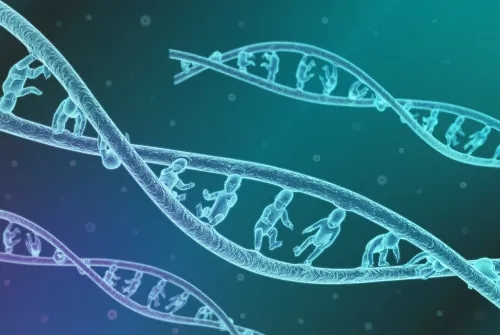Alo Yeditepe
Alo Yeditepe
Pre-implantation Genetic Diagnosis
Giving birth to a healthy child is more important than just having a child for couples. In this regard, recent advancements in diagnosis and treatment of genetic diseases are pivotal. Preimplantation genetic diagnosis (genetic analysis carried out before embryo is transferred to the uterus) enables early diagnosis of genetic diseases. Ending life of a living fetus with curettage due to a disease is a source of sorrow for both the doctor and the parent.
Healthy Babies Can Be Obtained
To have couples with carrier status of a genetic disease give birth to a healthy baby, embryos obtained through in vitro fertilization or microinjection are evaluated and healthy embryos are selected and transferred. Here, the aim is to prevent transmission of chromosomal anomalies, reduce risk of miscarriage and select genetically healthy embryos. Recently, pregnancies are achieved through transfer of embryos into the uterus following genetic analysis. Preimplantation genetic diagnosis may prevent death of newborn infant due to any disease that may emerge at the birth or in the future and thus, couples with carrier status of a genetic disease may give birth to a healthy child.
It is especially preferred in IVF patients with history of recurrent failure of implantation, advanced maternal age, recurrent miscarriage and presence of translocation as well as past obstetric history of aneuploidy in previous pregnancies. Moreover, tissue-compatible and healthy embryos can be selected that are healthy regarding a documented single-gene disease for women or men who have the disease.
Novel Methods Used for Preimplantation Genetic Diagnosis
Preimplantation Genetic Diagnosis has been used for approximately two decades and five chromosomes (13, 18, 21, X, Y or 13, 16, 18, 21, 22) were analyzed with FISH method in the preliminary phases of its evolution, but the figure is, now, 9 chromosomes. Recently, 24 chromosomes can be analyzed using Microarray (aCGH) technology and it is immediately followed by NGS technique that gained popularity quickly for in vitro fertilization therapies as of 2015.
What Are Advantages of Next Generation Sequencing (NGS)?
NGS is the abbreviation for Next Generation Sequencing which is a novel genetic analysis method used to screen 24 chromosomes in embryos. NGS is deemed a revolutionary DNA sequencing technology in the field of genetic research; it allows both numeric and structural analysis and sequencing of whole human genome within a very short period of time – one day. NGS can identify mosaic embryos better relative to other PGD techniques. Besides the ability to screen a very large locus of gene both numerically and structurally, other advantages include low error margin, more accurate results, quicker access to results and lower cost. Moreover, this method can combine analysis of single-gene diseases, HLA typing and screening of 24 chromosomes.
How is PGD Performed?
Preimplantation genetic diagnosis starts with intracytoplasmic sperm injection that implies meeting the egg of mother with sperm of father outside the body. When embryos reach Blastocyst phase on day 5 to 6 of development, several cells are biopsied without any damage to embryo; these cells are sent to genetic laboratory for 24-chromosome screening, while embryos are frozen. The risk of damage to embryo is very low, if this procedure is performed by an experienced embryologist. Embryo(s) with healthy genetic structure, as verified by this analysis, are transferred, after uterine cavity is prepared for implantation, and thus, higher conception rates can be obtained.
This content was prepared by Yeditepe University Hospitals Medical Editorial Board.
”
See Also
- What is Whooping Cough? The Importance of Whooping Cough Vaccination During Pregnancy
- Contraceptive Methods: Birth Control and Effective Protection Options
- What is Ovarian Reserve?
- Uterine Polyps, Symptoms and Treatment
- Genetic Diagnosis in IVF Treatment
- What Happens at 3rd Weeks of Pregnancy?
- What Happens at 2nd Week of Pregnancy?
- What is Endometriosis? What are the Symptoms of Endometriosis?
- What is Hormone Replacement Therapy (HRT)? How is HRT Performed?
- Hormonal Disorder Symptoms and Treatment
- What is Ureaplasma? How is Ureaplasma Treatment Done?
- What is Pelvic Floor? What are Their Duties?
- The Most Common Diseases in Women
- What is Hysteroscopy? Hysteroscopy Usage Areas
- What is Myoma? Myoma Symptoms and Treatment
- Early Menopause and Ovarian Failure Can Be Prevented
- What is Laparoscopic Surgery in Gynecology?
- Menopause Symptoms and Menopause Treatment
- Polycystic Ovary Syndrome and its Treatment
- Electromagnetic Stimulation in the Treatment of Endometriosis and Infertility
- How Does Working Life Affect Prospective Mothers?
- Causes of Female Infertility
- The Use of Non-Inpatient Closed Surgery is Increasing in Gynecological Diseases
- Chronic Pelvic Pain
- What is Polycystic Ovary Syndrome/PCOS?
- Postpartum Period
- 7 Effective Tips Against Urinary Incontinence
- Sperm Will Be Produced from Stem Cells Soon
- What is Menopause? When Does Menopause Age Begin? What are the Symptoms of Menopause?
- The Chance of Becoming a Father Increases with Microchip Technology
- Thanks to the Ovarian Rejuvenation Method, She Counts the Days for Birth!
- Tests That Need to Be Performed During Pregnancy
- Which Tests Should Expectant Mothers Not Neglect? What Tests Should Be Done While Pregnant?
- Some Patients Go Through Menopause Even at the Age of 15
- Stress Disrupts the Menstrual Cycle
- Myomas Can Grow During Pregnancy
- Useful Bacteria Increases IVF Success
- Polycystic Ovary Syndrome Can Occur If the Bacteria in the Gut Are Not Functioning Well
- Imaging Methods During Pregnancy
- After 16 Years, She Wanted to Be a Mother Again; She Experienced the Shock of Her Life
- These Diseases Affect Women Differently Than Men
- Beware of Chocolate Cyst! It Affects 1 in 10 Women
- Causes of Male Factor Infertility
- The Effect of Advanced Age on IVF Treatment
- Infertility
- Polycystic Ovary Syndrome
- Early Menopause
- Blocked Fallopian Tube
- Vaginismus
- Low Ovarian Reserve (AMH)
- Which Methods Increase Success in Treatment of Infertility?
- Intrauterine insemination (IUI)
- Microinjection
- Egg Cryopreservation
- Assisted Hatching
- Micro-chip
- Thyroid Diseases During Pregnancy Affect the Baby as Much as the Mother
- Urinary Tract Infections Can Be A Sign Of Menopause
- 10 Overlooked Signs of Menopause
- Endometriosis
- Co-Culture
- Ovarian Rejuvenation / PRP
- As Average Life Expectancy Increases, This Problem Will Be Seen More
- 'Early Age' Warning for Egg Freezing Procedure
- Beware, These Risks Increase After Menopause!
- This Problem Ruins the Lives of One in Every 10 Women
- Getting Cancer Treatment Does Not Stop You from Having Children!
- Prof. Dr. Attar: Endometriosis Can Be Associated With Some Chronic Diseases
- What Is the Period of Fertility? What Tests are Performed for Fertility?
- What Happens at 38 Weeks of Pregnancy?
- What Happens at 37 Weeks of Pregnancy?
- What Happens at 36 Weeks of Pregnancy?
- What Happens at 35 Weeks of Pregnancy?
- What Happens at 34 Weeks of Pregnancy?
- What Happens at 33 Weeks of Pregnancy?
- What Happens at 32 Weeks of Pregnancy?
- What Happens at 31 Weeks of Pregnancy?
- What Happens at 30 Weeks of Pregnancy?
- What Happens at 29 Weeks of Pregnancy?
- What Happens at 28 Weeks of Pregnancy?
- What Happens at 27 Weeks of Pregnancy?
- What Happens at 26 Weeks of Pregnancy?
- What Happens at 25 Weeks of Pregnancy?
- What Happens at 24 Weeks of Pregnancy?
- What Happens at 23 Weeks of Pregnancy?
- What Happens at 22 Weeks of Pregnancy?
- What Happens at 21 Weeks of Pregnancy?
- What Happens at 20 Weeks of Pregnancy?
- What Happens at 19 Weeks of Pregnancy?
- What Happens at 18 Weeks of Pregnancy?
- What Happens at 17 Weeks of Pregnancy?
- What Happens at 16 Weeks of Pregnancy?
- What Happens at 15 Weeks of Pregnancy?
- What Happens at 14 Weeks of Pregnancy?
- What Happens at 13 Weeks of Pregnancy?
- What Happens at 12 Weeks of Pregnancy?
- What Happens at 11 Weeks of Pregnancy?
- What Happens at 10 Weeks of Pregnancy?
- What Happens at 9 Weeks of Pregnancy?
- What Happens at 8 Weeks of Pregnancy?
- What Happens at 7 Weeks of Pregnancy?
- What Happens at 6 Weeks of Pregnancy?
- What Happens at 5 Weeks of Pregnancy?
- What Happens at 4 Weeks of Pregnancy?
- What Happens at 1st. Weeks of Pregnancy?
- Considerations for Embryo Transfer
- What Causes Menstrual Irregularity, How Is It Treated?
- Success in IVF after 43 Decreases to Five Percent
- Does Pregnant Coronaviruses Affect?
- Most Frequently Asked Questions During Pregnancy
- Untreated Genital Problems Can Cause Urinary Incontinence
- 1 in 10 Women Have This Problem; It Can Lead To Infertility
- Effective Results Can Be Achieved with PRP in Women with Low Egg Count
Alo Yeditepe










